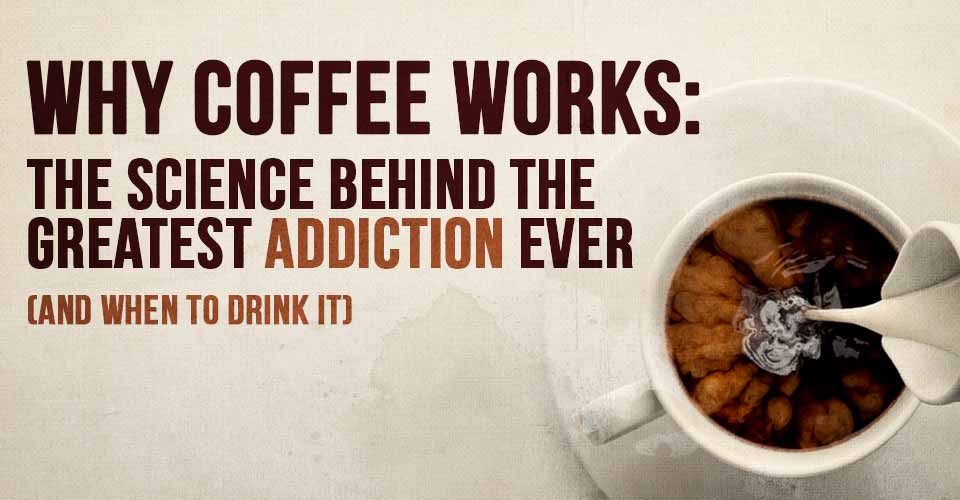Why Coffee Works: The Science Behind the Greatest Addiction Ever (and When to Drink It)

More than half of the American population (54%, to be exact) relies on coffee to get or keep their day going, and worldwide, over 300 tons of caffeine is ingested per day.
The United States is the largest buyer of coffee as a nation (though Finland consumes more on average per person), and globally it is the second most traded commodity after oil. To say the beverage is important to the ongoing development of society is quite the understatement; some even contend that coffee was responsible for ushering in the Enlightenment following the Dark Ages in European history.
So what does coffee actually do? As usual, neuroscience has the answer.
Coffee is responsible for increased alertness, happiness and productivity in humans, thanks to the caffeine it contains. Upon ingestion, caffeine is transported through the bloodstream to the brain, where it bonds with adenosine receptors. Adenosine is a chemical that we constantly secrete when we are awake, and is responsible for making us sleepy. Caffeine effectively blocks adenosine from doing its job in our brain by bonding with the same receptors. Furthermore, our brain creates more receptors in response to increased amounts of caffeine, which is part of the reason caffeine is addictive, and why not getting your daily fix can result in mild withdrawal symptoms.
That isn’t the whole story, though: caffeine also increases the body’s production of adrenaline, which increases blood flow, heart rate and helps open airways so that you can breathe more effectively. It also stops the reabsorption of the feel-good hormone dopamine by the brain, which basically leaves your brain swimming in the hormone and makes you feel happy. Pretty amazing drug, right?
As caffeine is a drug and it is addictive, the next logical question must be: is it possible to overdose on it? While it is possible to ingest enough caffeine to overdose, the quantity required to ingest enough coffee to overdose on caffeine is physiologically impossible. The amount of caffeine required to overdose is approximately 150mg per kg of body weight. Since coffee contains about 100mg per 8oz cup, a 90kg human being would have to drink 135 cups of coffee to ingest enough caffeine to overdose, and they’d have to drink it all at once. That’s about 8.44 gallons of coffee, which is impossible to ingest all at once. People who have overdosed on the caffeine have done so by taking too many caffeine pills or taking it in its pure powdered form.
It stands to reason, then, that one might want to seek out the optimal way to use such a powerful substance. Most of us wake up and want our coffee right away; research has shown, however, that it’s best to wait until 9:00 to 10:00a.m. to have our first cup. That’s because cortisol levels peak between 8:00 and 9:00 a.m. Cortisol helps us with alertness, and while it may seem like adding caffeine while it is peaking will just make us more alert, the opposite is actually true: cortisol levels inhibit caffeine’s effects and, over time, increase our tolerance, so we need to ingest more to get the same benefits. Science has shown that to optimize caffeine’s effects, it’s best to wait until after cortisol levels have peaked. Waiting until 9:00a.m. to roll around can feel like agony for the undercaffeinated, but your body uses the drug so much more effectively that it’s really worth the wait. FYI: cortisol also peaks between noon and 1:00p.m. and 5:30 and 6:30pm, so if you drink coffee like I do (all day every day) you might want to avoid it during these particular time periods.
While overdose and withdrawal are certainly concerns with any addictive substance, caffeine tends to be one of the more benign ones. Overdosing on coffee is impossible and trying to do so on pill-form caffeine brings with it a whole host of really uncomfortable problems. The withdrawal symptoms aren’t necessarily pleasant -splitting headache and severe fatigue being among them- but they’re not life-threatening either.
Coffee has been linked through various studies to plenty of other benefits which, while questionable in terms of application to a broad population, can include increases in antioxidant levels, libido, appetite suppressant and more.
So feel free to down a cup or two and enjoy, worry-free, the effects of what one aficionado calls “The greatest addiction ever.”


